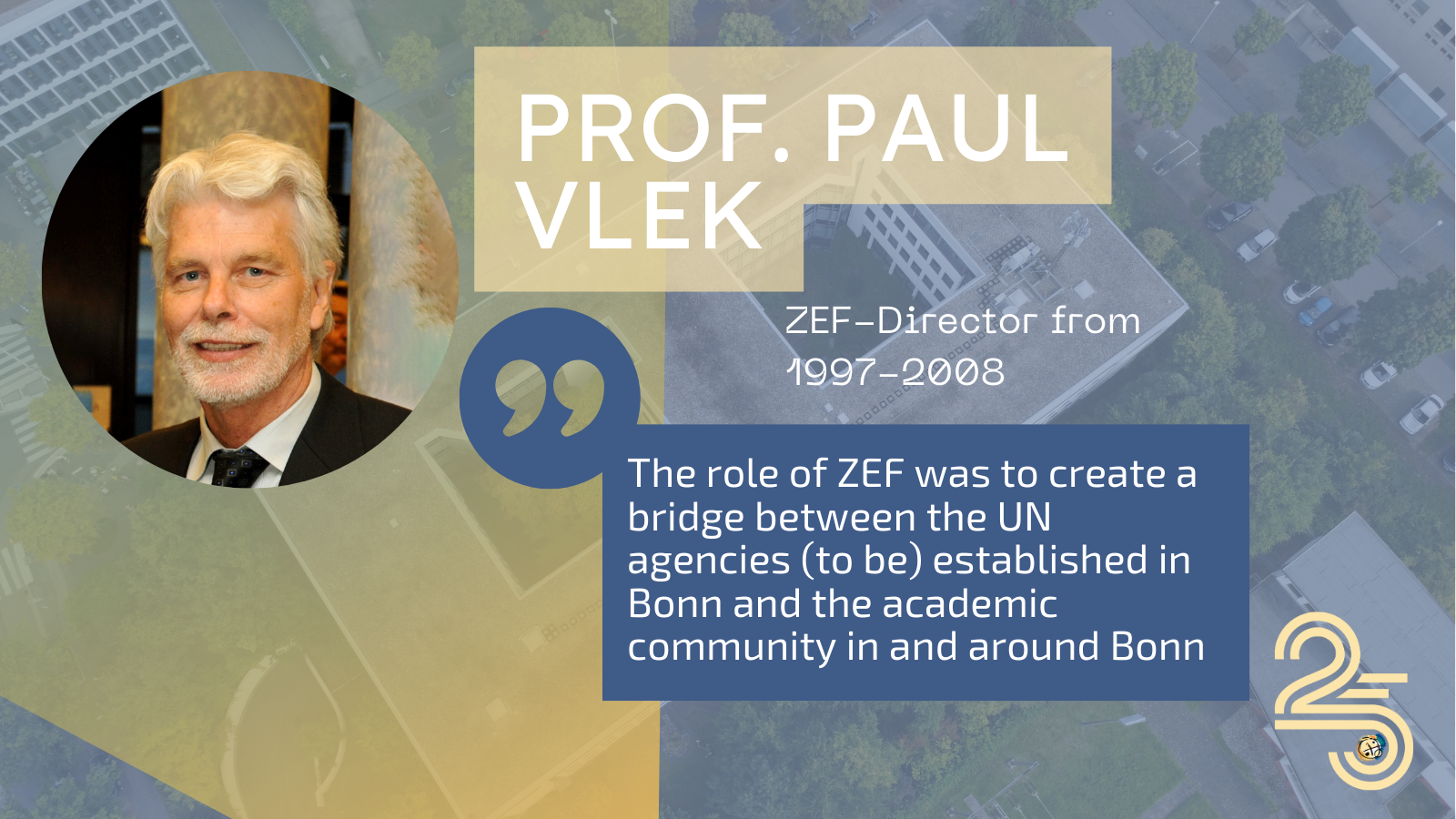Why was ZEF established 25 years ago?
In the early 90s the City of Bonn and its University were at a crossroads of two political developments at that time: the rapprochement of East and West Europe and the internationalization of Bonn after losing its status as Germany’s capital. With the help of key local, regional and national politicians, funds were earmarked for research centers working on these areas. Subsequently, a committee of Bonn University’s senate developed a concept for establishing the Center for European Integration Studies (ZEI) and the Center for Development Research (ZEF) as research institutions on the east-west and north-south axis of the world, respectively. The role of ZEF was to create a bridge between the UN agencies (to be) established in Bonn and the academic community in and around Bonn, therewith supporting the missions of these agencies: addressing climate change, natural resource degradation and the need for building and strengthening human resources in the South.
What were the main agenda items on the development research agenda at the time?
The three inaugural directors (Joachim von Braun, Andreas Wimmer and myself) developed a strategic plan on the basis of the University’s senate concept. We aimed to convert the senate’s vision and mission into a set of priority research areas in which the University of Bonn and its partners could provide their expertise. The initial focus was on water, land and biological resources, as well as on the role they played in developmental processes in the Global South. But we also looked at the socio-economic constraints these resources posed on development and the strain they were under, due to development. The basic idea was to first understand and then find a solution to the problem, whether it was socio-political, economic, or technical in nature. To get to the heart of this analysis we pursued an inter-disciplinary approach, which gradually transformed into a transdisciplinary way of analysis and search for solutions. The three departments (political and cultural change, ecology and natural resource management and economic and technological change) worked closely together in e.g. analyzing the water issues in the Volta basin, in addressing secondary forest management in the Amazon, in looking at land and water use in the lower Amudarya basin in Uzbekistan and in protecting coffee genetic resources in the Ethiopian highlands. These projects also hosted numerous PhD students. But easily as many students came to ZEF to pursue their own ideas on how to address problems they perceived relevant in their home countries. These students were coached by the ZEF doctoral program team and received academic guidance as well as their credentials from the different faculties and colleagues of the University of Bonn and surrounding institutions.
In your opinion: What have been ZEF’s main achievements and what the biggest challenges as a research and doctoral educational institute?
Possibly the most significant achievement is the demonstration that inter-and transdisciplinary research is sound and effective and can be taught to a new generation of scientists. The concept eventually was recognized by the University of Bonn, as it adopted the ZEF PhD program in its family of Bonn International Graduate Schools (BIGS). Numerous institutes within and outside Germany have adopted the approach, which is the highest form of recognition. Close to 500 graduates of the program and former staff at ZEF are pursuing careers around the globe and spreading the word. Not to be under-valued is the lasting impact of some of the major projects undertaken by ZEF in the regions of interest, e.g. the designation of Ethiopia’s endangered coffee forests as a natural heritage site by UNESCO. This was a direct result from ZEF’s work on the topic in the region, carried out in close cooperation with its local partners.
ZEF and its doctoral program turn 25 this year: What are your wishes but also suggestions for their future agenda?
ZEF successfully dissolved disciplinary silos and I hope it will guard against silo formation in the years to come. Inter- and transdisciplinary research has transaction costs, but its effectiveness in development research more than makes up for these costs. I hope the ZEF departments will continue to jointly submit research proposals to address urgent development constraints in the Global South, and the impact of development on the natural resource base and human well-being. In particular, it should take on board the critical threat of climate change, which impacts most development processes and deserves to be a department in itself. – Heartfelt congratulations to ZEF!
Paul Vlek was ZEF-Director from 1997-2014



Leave a Reply